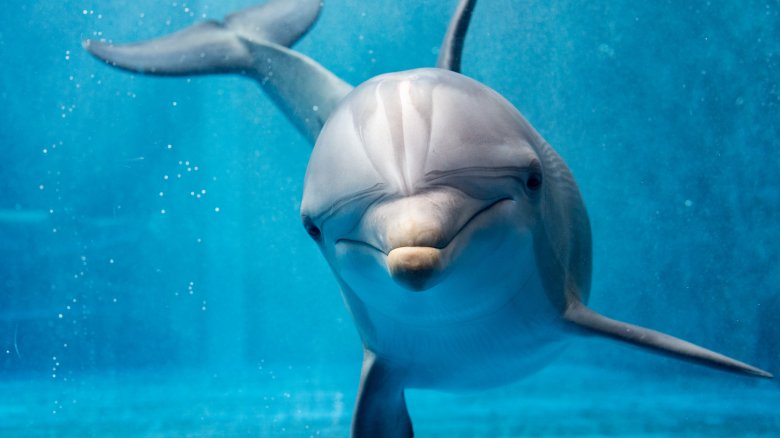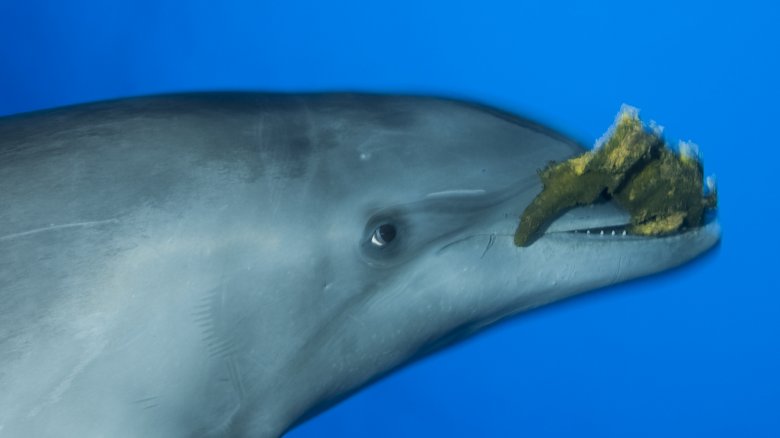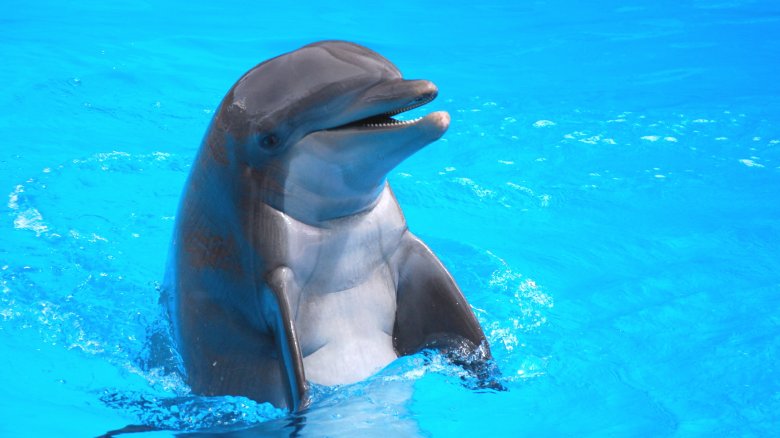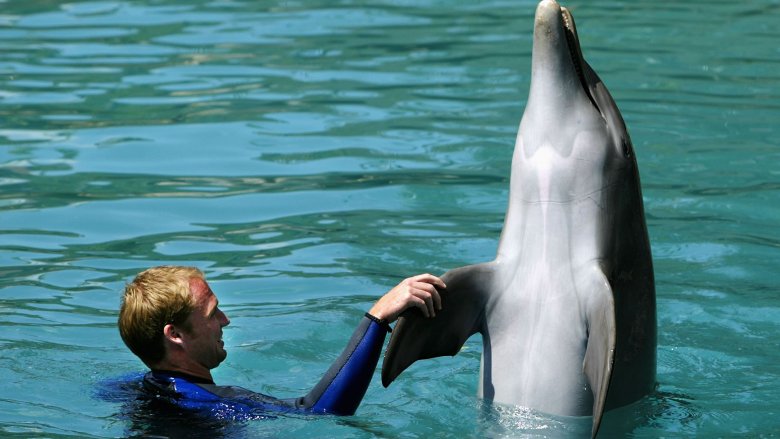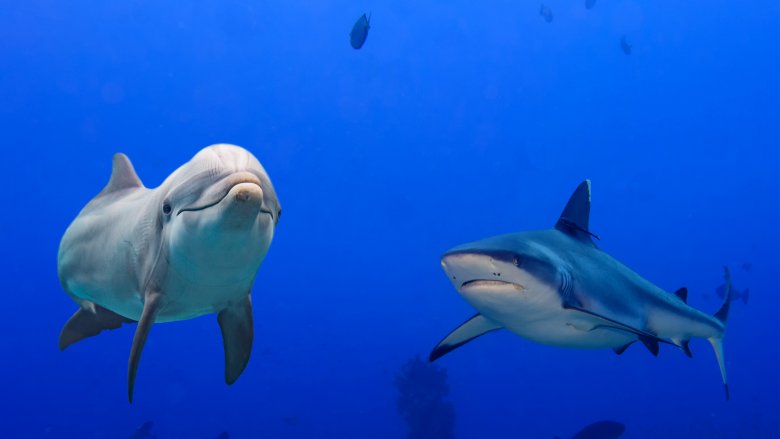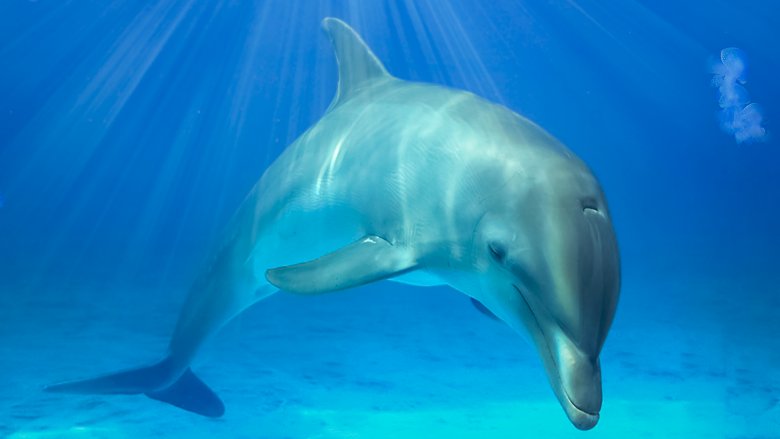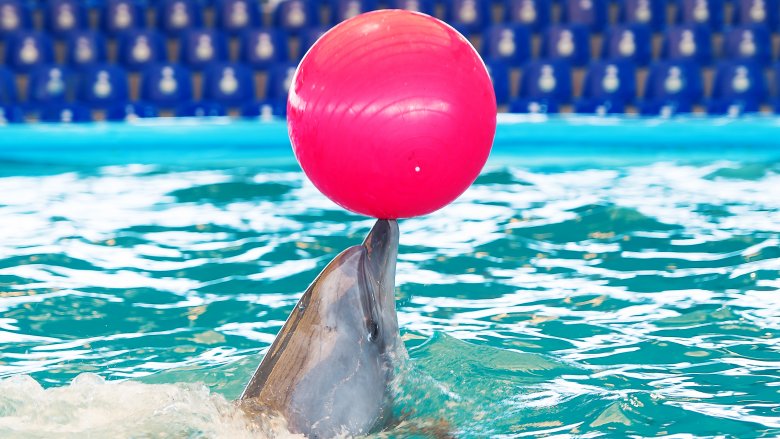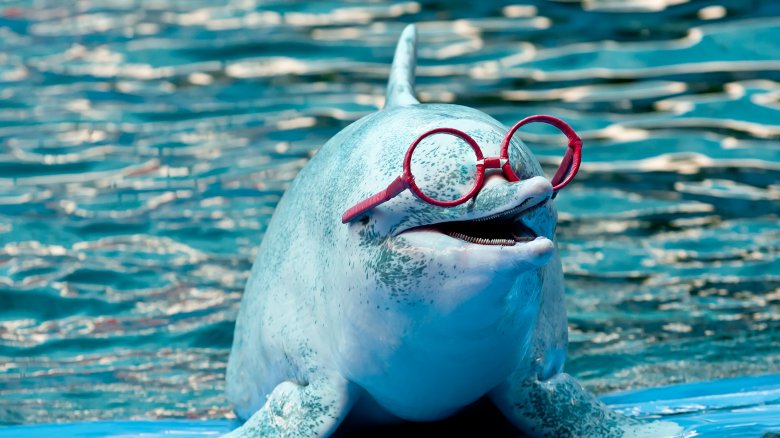Are Dolphins Really That Smart? (And Other Cool Dolphin Facts)
To paraphrase Lenny Leonard, a (fictional yellow) man who tragically lost his life to a dolphin, dolphins might be the clowns of the sea but it's dangerous to ever underestimate their intelligence. But are these aquatic mammals really as intelligent as everyone thinks, or are we simply projecting greater intelligence on them because they remind of us of ourselves? Get loosened up for some mental backflips — here come a bunch of dolphin facts you probably weren't ready for.
They sometimes wear sponges as masks
Dolphins are one of only a handful of animals we've observed using tools in their own environment. Specifically, according to research from Georgetown University, some bottlenose dolphins wear sea sponges on their noses while foraging for food on the ocean floor, protecting their delicate beaks from the pinches of angry crabs and the edges of sharp rocks. The behavior is more common in females and seems to be passed down by mother dolphins.
Now, dolphins are more than capable of catching fish that aren't hidden below the sand. One popular theory is that the dolphins somehow know that the food on the ocean floor has more nutrition than other sources. That's because bottom-dwelling fish are often relatively sedentary, making them more fatty and calorie-rich than comparably sized non-bottom-dwelling swimmers. Bottom-dwelling fish are also much easier for dolphins to catch because they aren't very good at escaping, usually only darting a few feet to safety. That's an easy meal for a predator as agile as the dolphin.
They can set traps and plan ahead
Dolphins can famously be trained to respond to a baffling array of commands. According to The Guardian, one particularly interesting example of this occurred at the Institute for Marine Mammal Studies in Mississippi where resident dolphins were trained to collect any trash that fell into their tanks and give it to trainers in return for fish. Soon, a dolphin named Kelly learned that she could collect and hide pieces of paper and then tear the paper into smaller pieces to get multiple fish. This showed dolphins are capable of forward planning and can understand the concept of delayed gratification, basically holding off on a small reward now for a possibly much larger reward later.
Kelly though wasn't done flexing her intellect, though. One day, the dolphin caught a seagull that landed in her tank. When she gave it to a researcher, she was rewarded with a big ol' handful of fish. Underwater lightbulb moment! Kelly then began leaving fish out in the open to lure in more seagulls, which she quickly killed and traded in for even more fish. Kelly also taught this seagull murder trap to her offspring, who in turn taught it to other dolphins.
So yeah, if dolphins ever begin systematically taking out humans one by one, know that they won't be doing it because of climate change or because we flush sewage into the ocean. They'll be doing it for the fishies.
They're exceptionally talented mimics
Dolphins are regarded as one the finest mimics in the animal kingdom, one of the only known species that's consistently good at vocal and behavioral mimicry. Most mimic-capable species can only mimic physical actions or vocal patterns, but dolphins can do both. (That means they have double the opportunity for mockery.) Think of monkeys, for example, which can emulate us physically but cannot mimic our vocalizations, or parrots which can do the opposite.
What makes this all the more impressive is that dolphins are able to replicate sounds that don't exist within their own ecosystem. For example, bottlenose dolphins have proven very capable of mimicking synthesized sounds that are unlike their usual vocalizations, copying sounds totally alien to them. Dolphins can also mimic observed behaviors in other species even if those behaviors are unnatural to them — for a reward. This is why dolphins can be trained to mimic human movements even though their physiology doesn't naturally support them. As simple as this sounds, the difference in human and dolphin physiology makes this especially impressive — the dolphins must consciously relate parts of their anatomy to human anatomy when mimicking them, consciously realizing that a flipper is the dolphin equivalent of a human's arm and so on. At this rate, it's only a matter of time until dolphins start hitting the standup comedy circuit.
They get high on pufferfish
Dolphins are among only a few animals in nature that do certain things for fun, like have sex for pleasure or do backflips for no other reason than to be goofy. However, it's still a little surprising that they've been observed huffing pufferfish toxin to get high, according to documentary footage from the BBC.
This behavior was observed in a pod of young dolphins in 2013; they carefully chewed on one poor pufferfish to make it release the goodies. In this case, the goodie was a potent nerve toxin that can cause death. In small enough doses, it can have a narcotic effect. The young dolphins seemingly knew exactly how long to chew on the helpless and presumably terrified fish before passing it along to the next dolphin, much like stoned teenagers would pass a bong. The dolphins then swam around in aimless, blissful circles and apparently became fascinated with their own reflections.
Experts could come up with no reasonable explanation for why the dolphins would do this other than that they derived enjoyment from the narcotic effect of said toxin. As if the idea of stoned dolphins wasn't hilarious enough, it's worth noting that this documentary footage was shot with cameras hidden inside a fake turtle.
They can shrug off shark bites like it ain't no thing
Although you probably don't think about it all that much, dolphins are surprisingly hardy creatures and possess remarkable regenerative abilities bordering on the superhuman (super-dolphin?). To see proof, let's look at how bottlenose dolphins react to being bitten by sharks, or really how they don't react.
Dolphins, to put it bluntly, don't care much about being bitten by sharks and can happily swim around with huge chunks of flesh torn from their bodies "larger than a basketball," according to a researcher from the Georgetown University Medical Center. We could stop there, but we won't. These wounds heal in mere weeks, rarely get infected, and heal perfectly, leaving behind only light scarring but no indentations or other evidence there was a big ol' shark injury there not too long ago. Dolphins don't even seem to feel pain from these wounds, being observed carrying on as normal with huge holes in their bodies and showing no signs of discomfort even though they have an open wound literally filled with saltwater.
The reason dolphins are so nonchalant about what would be a mortal wound for a lesser animal is that their bodies release both antibacterial and pain-relieving chemicals, cleaning the wound and making the healing process largely painless. Researchers are currently studying these impressive abilities for possible human applications because no species deserves to be afraid of sharks.
Should dolphins and whales be classified as 'non-human persons'?
Due to their highly social nature and because they're so damn adorable, there's a movement with significant support from some in the scientific community to ban the act of keeping dolphins in captivity. According to the BBC, some ethics experts have argued that dolphins "are sufficiently intelligent to justify the same ethical considerations as humans," adding that because of their cognitive abilities and fact that they're aware of their own existence, the animals should be considered "human in a philosophical sense." This, it is argued, would allow dolphins to be protected by laws designed to protect vulnerable humans and there's even a Declaration of Rights for cetaceans.
One example of the supposed humanity of dolphins and whales that makes them eligible for honorary personhood is the fact dolphins are able to recognize themselves as individuals. Some say this makes killing, mistreating, or imprisoning them morally equivalent to doing the same to a human being. Important question: if some dolphins already use masks, is it still wrong to give them nice Santa hats?
They never technically need to sleep
As mammals that need to periodically surface for air every few minutes, dolphins can't sleep without risking drowning. Dolphins and other cetaceans, like whales, have instead evolved a remarkable adaptation. Each creature can turn off half its brain, remaining conscious while essentially being half asleep, according to LiveScience.
Technically called "unihemispheric slow-wave sleep," when dolphin brains power down to 50 percent, they close the opposite eye (leaving one open to scan for danger) and enter what amounts to dolphin autopilot to rest while still remaining conscious of their surroundings. Unlike virtually every animal in the world, sleeping dolphins can still control their movements, swimming slowly, surfacing for air, and scanning the environment for threats.
It's basically impossible to ever deprive a dolphin of sleep, and studies have shown that no amount of sleep deprivation as we understand it impacts a dolphin's ability to respond to stimulus. In one experiment done by the U.S. Navy, two dolphins were trained to respond to a series of beeps that were then played over the course of the next five days at random times. At no point during the experiment did the dolphin's reaction time ever slow or diminish, even when it was "asleep." Dolphins are always ready and always watching. Always.
They can work with humans for mutual gain
Although they're fantastic hunters and are capable of easily catching a wide array of prey, dolphins much prefer to hustle for their lunch. For example, in the Brazilian municipality of Laguna, dolphins have learned to work with human fishermen.
The dolphins will drive large schools of fish toward shallower water before signaling to gathered fisherman to throw out their nets. After they haul in their catch, the fishermen will then reward the dolphins with some fish. Although we know for sure that this symbiotic relationship has existed since at least the 19th century, according to Slate, it isn't clear if the original dolphins were taught by early fishermen, if the dolphins trained the humans, or if the relationship evolved naturally over time.
Perhaps the most famous working dolphin was Pelorus Jack, a Risso's dolphin that would regularly guide ships through a particularly perilous patch of sea in New Zealand between 1888 and 1912. Jack was good at his job, and it's claimed that no ship ever sunk under his watch. Because Jack was important and well-liked by sailors, a law was quickly passed to protect the helpful dolphin. Opinion is divided on why Jack did helped out, with theories ranging from boredom to loneliness. Maybe he just always wanted to be a lighthouse.
Males lift to impress lady dolphins
Dolphins are often said to be just like us. That statement is hard to argue when you consider that boto dolphins in the Amazon sometimes lift heavy objects just to show off. Yes, just like seasoned gym bros, some dolphins like to lift heavy objects for no other reason than to try to appear more attractive to the opposite sex and to intimidate other males.
Fittingly, this is a behavior mostly witnessed in overly aggressive males. Dolphins who lifted were 40 times more likely to attack or act aggressively toward other males. Male boto ("bro-to"?) dolphins that lifted and carried the sticks and weeds seemed to use the objects as a declaration of their power, thrashing about at the surface of the water while holding them to show off how cool and strong they are. Whether or not this actually has the desired and presumed effect of enticing females and warding off other males isn't clear, although some evidence suggests that lifters might end up fathering more calves. We'll know more when we find the dolphin gyms.
Are dolphins really that smart?
Despite their intelligence being one of their most famous attributes, experts and researchers are still divided on whether or not dolphins are as smart as most people think they are.
For example, it's commonly claimed that dolphins possess a larger brain than a chimpanzee, so they must be smarter, right? Although dolphins do have very large brains (even larger than ours), the size of a brain doesn't necessarily say anything about the intelligence of the creature it belongs to. Chickens have passed many of the same cognition tests as dolphins, like recognizing members of their own group and displaying empathy for their own kind. Chicken brains are about the size of a walnut, to be generous.
This isn't to say that dolphins aren't intelligent. It's just that many of the feats attributed to them are commonly observed in other animals not often considered to be intelligent. It has been argued by some, like researcher Paul Manger, that dolphin intelligence has been vastly overstated and that the animal's popularity means we just ignore evidence that other animals show similar or greater intellectual ability in tests. Dolphins are still remarkably intelligent creatures capable of cognitive feats not commonly observed in most animals. They can recognize themselves in a mirror! But so can magpies and ants, so, ya know ... take it with a grain of salt and maybe tone down the dolphin love.
